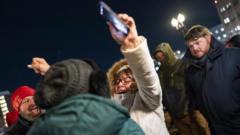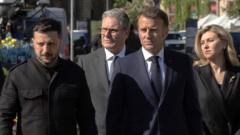The decision by Trump to pardon a majority of January 6 defendants has raised significant backlash and concerns regarding the implications of condoning violence against democratic institutions.
Trump Issues Sweeping Pardons for January 6 Defendants, Igniting Controversy

Trump Issues Sweeping Pardons for January 6 Defendants, Igniting Controversy
Donald Trump's executive order grants leniency to Capitol riot participants, sparking a national debate over justice and accountability.
Former President Donald Trump has taken a bold step in issuing pardons that affect numerous individuals involved in the January 6, 2021, Capitol riots. This dramatic move on his first day in office came as a surprise even to some members of his inner circle, who previously expressed skepticism about a blanket pardon for the rioters. Trump's decision, however, has effectively lifted the sentences of many defendants, allowing them a second chance that many of their supporters had long sought.
In recent weeks, key members of Trump's team had been vocal about separating violent offenders from those engaged in non-violent behaviors during the unrest. Vice-President JD Vance previously stated that violence should not be met with clemency. Trump’s nominee for Attorney General, Pam Bondi, also called for individual evaluations of over 1,500 cases tied to the insurrection.
Despite such sentiments, Trump’s sweeping pardons negate the distinctions among the participants. "What they have done to these people is outrageous," Trump commented after signing the order, asserting that they have suffered unjustly for their actions. Celebrations outside a Washington D.C. detention center erupted after the release of prominent rioter Enrique Tarrio, whose mother exuberantly praised the decision on social media. Another released individual, Rachel Powell, expressed her relief at returning home in time for her son's birthday, thanking Trump for his promises.
The fallout from this mass release has left critics, including legal experts and human rights advocates, taken aback by the lack of differentiation in sentencing. Lisa Gilbert from Public Citizen decried it as a shocking contradiction to the law-and-order platform Trump championed. The Justice Department previously indicated that approximately 1,583 individuals faced legal repercussions due to January 6, including around 600 for assaulting officers.
In contrast to the celebrations, many in the law enforcement community, such as Capitol Police officer Winston Pingeon, expressed their dismay. Pingeon noted that pardoning individuals charged with violent actions serves as a "slap in the face" to those impacted by the riots. Polling data indicates that public opinion leans against the pardoning of those who committed serious offenses during the Capitol attack, highlighting a broader concern about accountability.
Among those granted clemency were members of extremist groups like the Proud Boys and Oath Keepers, prompting fears of renewed activity from these organizations. The release of key figures such as Stewart Rhodes, leader of the Oath Keepers, raises questions about the future presence of these extremist factions. Wendy Via from the Global Project Against Hate and Extremism cautioned that Trump's actions signal that violence is acceptable when aligned with his interests.
As the political landscape grapples with the implications of these pardons, observers remain vigilant about the ramifications for both the legal system and the fabric of American democracy.






















